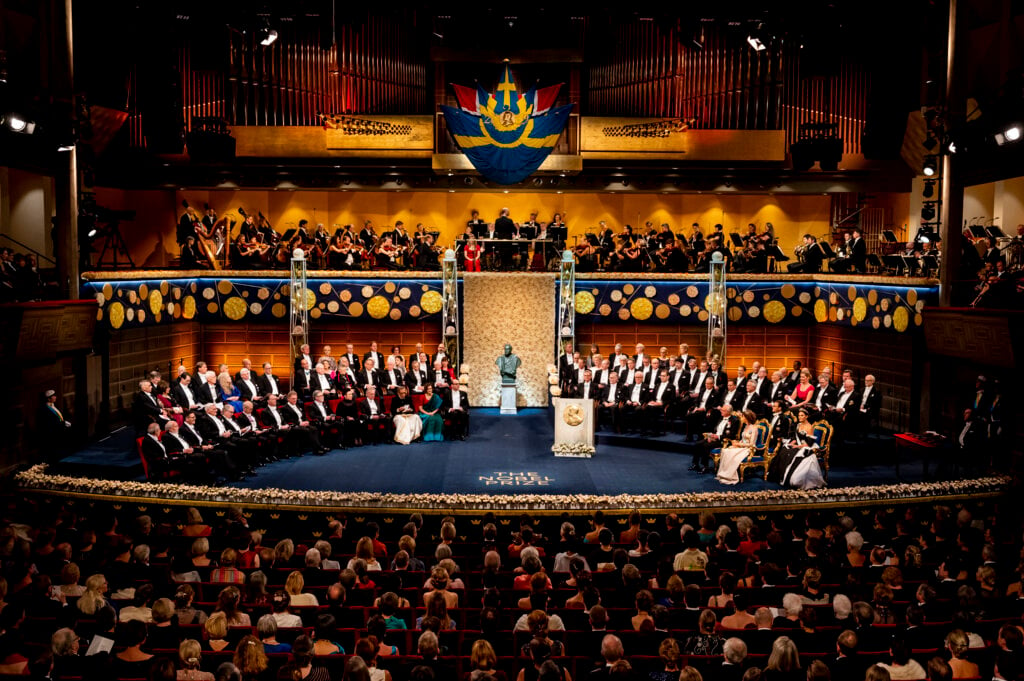By Jeremiah Aminu
The Nobel Prize, which commenced in 1901, is one of the most recognised and prestigious awards that is used to celebrate the trailblazing achievements and contributions of certain individuals to science, humanism, and peace efforts. During its burgeoning stage, it, first of all, centred around five categories—physics, chemistry, physiology or medicine, literature, and peace, as specified in Alfred Nobel’s will. It wasn’t until 1969 that Economic Sciences was introduced as a sixth category by Sveriges Riksbank to commemorate the memory of Alfred Nobel. Even to this day, this prize is used to acknowledge the groundbreaking achievements of certain individuals within these highlighted fields every year in October.
This year (2025), there are certain trailblazers who have made cutting-edge and noteworthy contributions within the fields of physics, chemistry, physiology or medicine, literature, peace, and economic sciences. It is, thus, the focus of this article to identify these individuals and their contributions to the progression of society and the development of humankind.
The 2025 Nobel Prize Winners for Physiology or Medicine—Shimon Sagakuchi, Mary E. Brunkow, and Fred Ramsdell
READ ALSO: Can Donald Trump win Nobel Peace Prize?
The 2025 Nobel Prize for physiology (or medicine) was awarded to Japanese biologist (Shimon Sagakuchi) and American biologists (Fred Ramsdell and Mary E. Brunkow). This prize was awarded to them by the Karolinska Institutet on October 6, 2025 for their research on the immune system, most especially on regulatory T cells which prevent other T cells from attacking the “body’s own cells”. Consequently, this study has also provided new methods of treating cancer and autoimmune diseases. This is corroborated by the Nobel Prize website which states that:
“Mary E. Brunkow, Fred Ramsdell, and Shimon Sakaguchi made groundbreaking discoveries concerning peripheral immune tolerance that prevents the immune system from harming the body. Their discoveries have laid the foundation for a new field of research and spurred the development of new treatments, for example for cancer and autoimmune diseases”.
The 2025 Nobel Prize Winners for Physics—John Clarke, John M. Martinis, and Michel H. Devoret
The 2025 Nobel Prize in Physics was awarded to British physicist (John Clarke), French physicist (Michel H. Devoret), and American physicist (John M. Martinis) on October 7, 2025. This is as a result of their cutting-edge contribution to the advancement of quantum technology. As stated on the Nobel Prize website, they “conducted experiments with an electrical circuit in which they demonstrated both quantum mechanical tunnelling and quantised energy levels in a system big enough to be held in the hand”. This study has the potential to advance future research on quantum technology, including “quantum cryptography, quantum computers, and quantum sensors”.
The 2025 Nobel Prize Winners for Chemistry—Susumu Kitagawa, Richard Robson, and Omar M. Yaghi
On October 8, 2025, Japanese chemist (Susumu Kitagawa), English chemist (Richard Robson), and American chemist (Omar M. Yaghi) received the 2025 Nobel Prize in Chemistry for their development of a new type of molecular architecture, particularly metal-organic frameworks (MOFs). These frameworks, according to Britannica, possess “tunable structures that have enabled advances in gas storage, catalysis, and environmental applications”. Consequently, these frameworks have provided chemists with methods to resolve certain challenges that we experience in society, as stated on the Nobel Prize website.
The 2025 Nobel Prize Winner for Literature—László Krasznahorkai
The Hungarian Author, László Krasznahorkai, was awarded the Nobel Prize for literature on October 9, 2025. This is due to his “compelling and visionary oeuvre that, in the midst of apocalyptic terror, reaffirms the power of art”. Some of such notable literary works that constitute his oeuvre include Satantango (1985), The Melancholy of Resistance (1989), War & War (1999), A Mountain to the North, a Lake to the South, Paths to the West, a River to the East (2003), and Herscht 07769: A Novel (2021). It is for this reason that Krasznahorkai is recognised as the “master of apocalyptic narratives”.
The 2025 Nobel Peace Prize Winner—Maria Corina Machado
The Venezuelan politician, Maria Machado, received the Nobel Peace Prize on October 10, 2025, for her contributions towards the promotion of democracy within Venezuela. She was recognised “for her tireless work in promoting democratic rights for the people of Venezuela and for her struggle to achieve a just and peaceful transition from dictatorship to democracy”. Further details reveal that she has also been “a key, unifying figure in a political opposition that was once deeply divided—an opposition that found common ground in the demand for free elections and representative government”. It is these noteworthy contributions that deem Machado as one who is worthy of recognition regarding the Nobel Peace Prize for this year.
The 2025 Nobel Prize Winners for Economics (the Sveriges Riksbank Prize in Economic Sciences in Memory of Alfred Nobel)—Joel Mokyr, Phillipe Aghion, and Peter Howitt
On October 13, 2025, the Nobel Prize for Economics was awarded to Israeli-American economic historian (Joel Mokyr), French economist (Phillipe Aghion), and Canadian economist (Peter Howitt). This award recognition can be traced to their contributions in underscoring how innovation (“new technology”) functions as a driving force for sustained growth. Joel Mokyr, on the one hand, “identified the prerequisites for sustained growth through technological progress”. On the other hand, Aghion and Howitt were recognised for “the theory of sustained growth through creative destruction”. Additional details provided by the Nobel Prize website indicate the significance of their contributions, stating that:
READ ALSO: Remi Tinubu donates N50m to best female graduates at JABU
“The laureates have taught us that sustained growth cannot be taken for granted. Economic stagnation, not growth, has been the norm for most of human history. Their work shows that we must be aware of, and counteract, threats to continued growth”.



